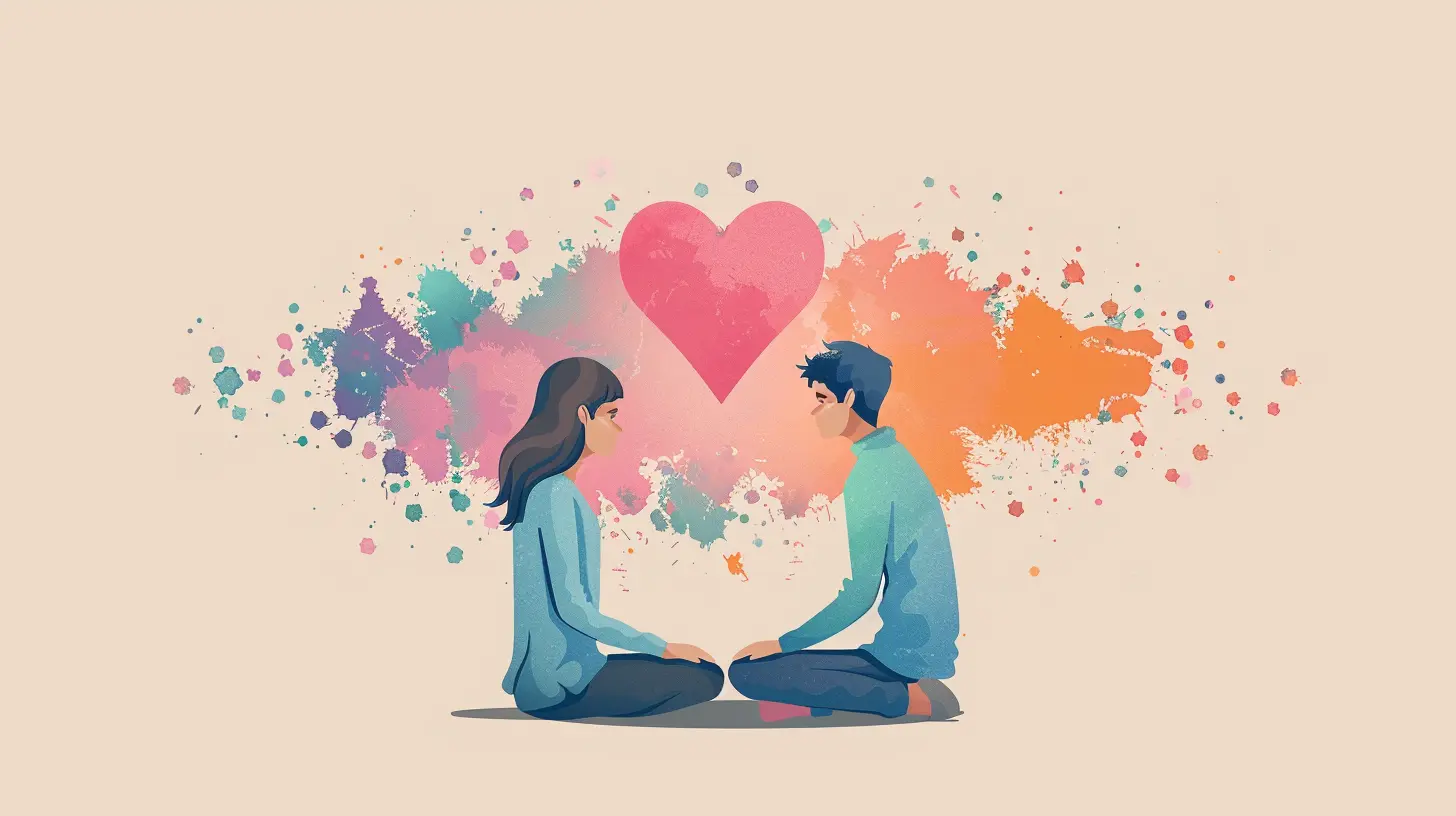How to Manage Relationship Stress for Better Mental Health
24 November 2025
Let’s be honest—relationships are hard work.
Whether it’s your partner, family, friends, or even coworkers, tensions can rise, misunderstandings happen, and suddenly, you’re spiraling into a ball of stress. It’s like carrying an emotional backpack that keeps getting heavier. And guess what? That stress doesn’t just hang out in your head—it messes with your mental health big time.
But here’s the good news: you can absolutely manage relationship stress and protect your mental health at the same time. All it takes is a little awareness, a few simple habits, and a whole lot of self-love.
In this feel-good, action-packed guide, we’re diving into exactly how to manage relationship stress so that your mental well-being shines bright like a diamond. Ready? Let’s go!
💡 What Is Relationship Stress Anyway?
Okay—before we jump into fixing it, let’s break down what relationship stress really is.Relationship stress is the tension, anxiety, or emotional strain that comes from interactions with someone close to you. It could stem from:
- Arguments or conflicts
- Lack of communication
- Unrealistic expectations
- Feeling unappreciated
- Emotional or physical distance
- Or even just the daily grind of life rubbing your nerves raw
Sound familiar? You're not alone. Everyone faces it at some point—even in the healthiest relationships.
But here's the kicker: when left unchecked, that stress can sneakily affect your sleep, self-esteem, and even your physical health. So it's not just an emotional problem—it's a full-body experience. Yikes, right?
👩⚕️ How Relationship Stress Affects Mental Health
Let’s connect the dots between your relationships and your mental well-being.Chronic relationship tension can lead to:
- 📉 Anxiety and depression
- 😴 Sleep disturbances
- 😠 Heightened irritability
- 🧠 Decreased concentration
- 😵💫 Emotional exhaustion
- 🦠 Weakened immune system (yes, really!)
In short, a stressed-out relationship can leave you mentally (and physically) drained. But here's the magic part: when you learn how to handle relationship stress, you don’t just fix the relationship—you boost your entire mental and emotional glow-up.
🧘♀️ 1. Prioritize Open and Honest Communication
Let’s start with a biggie—communication.Ever heard the saying, “Communication is the glue of relationships”? Yep, it’s that important.
Bottling up your feelings is like shaking a soda can and screwing the lid tighter. Eventually, it’s gonna blow. Instead, practice open, honest, and kind communication.
Try This:
- Use “I” statements instead of “you” ones. For example: “I feel hurt when I’m not listened to,” instead of “You never listen to me.”
- Schedule regular “check-in” conversations to talk about feelings and needs.
- Avoid jumping to conclusions—ask questions instead.
Think of communication as your relationship's Wi-Fi. If it’s weak, everything else buffers.
🧠 2. Recognize Your Triggers
You know those little moments that instantly put you in a funk? Yep, those are your triggers.Everyone has emotional hot-buttons. Maybe it’s being ignored. Or criticized. Or having your time dismissed.
Recognizing your triggers helps you respond thoughtfully instead of reacting emotionally. It’s like knowing where the potholes are on your favorite road—you can steer around them.
Quick Tip:
Keep a stress journal. Jot down stressful interactions, how you felt, and what triggered it. Patterns will start to appear like magic.
🌿 3. Take Time for Yourself
This isn’t selfish—it’s necessary.Too much closeness without space can turn even the coziest relationship into a pressure cooker. You need room to breathe, think, and be YOU.
Me-Time Ideas:
- Read a book
- Go for a solo walk
- Try meditation or deep breathing
- Dip into a new hobby
- Journal your thoughts
You can’t pour from an empty cup, right? Fill yours often.
💬 4. Set Healthy Boundaries
Imagine trying to build a house without any walls. Chaos, right? That’s what relationships are like without boundaries.Boundaries = Clarity. They’re the invisible fences that protect your emotional well-being without blocking love.
Boundaries Might Sound Like:
- “I’m not okay with yelling during arguments.”
- “I need time before I respond to tough conversations.”
- “I care about you, but I’m not available 24/7.”
Healthy boundaries are the difference between feeling safe in a relationship and feeling suffocated.
😌 5. Don’t Sweat the Small Stuff (Perspective Is Everything)
Let’s get real. Not every disagreement needs to be a battleground.Sometimes your partner forgets the dishes. Your best friend texts back late. Your coworker’s tone feels off.
Pause. Breathe. Ask yourself: “Will this matter in a week? A month?”
Chances are, the little things aren’t worth the emotional energy. Save your strength for the big stuff. And when in doubt—choose grace over grudge.
😊 6. Practice Empathy Like It’s a Superpower
Empathy is the secret sauce of all healthy relationships.It means stepping into someone else’s shoes—even when they’re a size 10 and you’re a 7. Understand their feelings. Listen without interrupting. Show up even when it’s awkward.
When both people in a relationship practice empathy, conflict becomes connection.
💬 “I don’t understand exactly what you’re feeling, but I’m here for you.”
Boom. It makes all the difference.
❤️ 7. Celebrate the Good Stuff
When was the last time you complimented your partner or thanked your friend for being awesome?It’s easy to get so wrapped up in the stress that we forget to notice the good. But positive reinforcement isn’t just for dogs—it works wonders for people, too.
Send a sweet text. Say, “I appreciate you.” Make time for laughter. Revisit happy memories.
Shining a spotlight on the positives can help dim the tension. After all, love grows where it’s watered.
🧺 8. Don’t Drag Past Baggage into Present Moments
We all have stories. Old wounds. Past betrayals. Emotional baggage.And while it’s okay to have a suitcase of experiences, don’t unzip it and dump it on today’s issues. Deal with today… today.
Ask yourself: Am I reacting to the current moment or old pain pretending to be new?
If past pain keeps popping up, therapy can help you unpack and heal. You owe it to yourself (and your relationships).
☀️ 9. Work on Your Own Mental Health
Strong relationships happen when both people are emotionally grounded. So one of the best ways to reduce relationship stress? Take care of your own mind.Go to therapy. Practice self-care. Eat right. Sleep enough. Move your body. Say nice things to yourself.
When you’re mentally strong, you're less shaken by arguments and better at solving problems with compassion.
It’s like putting on your oxygen mask first—you’re way more helpful if you can breathe easily.
🤝 10. Know When to Get External Help
Hey, even the best relationships need a tune-up.If stress is becoming the third wheel in your relationship, don’t be shy about reaching out for help. Therapists, relationship coaches, or counselors can work magic by giving you tools, insights, and new perspectives.
There’s no shame in needing support. In fact, asking for help is one of the bravest things you can do.
🎉 Real Talk: Healthy Relationships Are a Journey, Not a Destination
Let’s wrap this up with a heart-to-heart.No relationship is perfect. But stress doesn’t have to be the script you follow. With a little reflection, a sprinkle of communication, and a whole lot of self-love, you can turn relationship stress into strength.
Your mental health deserves peace. Your relationships deserve effort. And you deserve the joy that comes from both working in harmony.
So take a deep breath, put these tools into action, and remember: You've got this. 💖
✨ Final Thoughts
Managing relationship stress for better mental health isn’t about fixing everything overnight. It’s about building habits that bring understanding, peace, and resilience to your life.When you treat yourself and your relationships with kindness, patience, and empathy, you feel lighter. Happier. More you.
Start small. Stay consistent. Make mental health a priority—not an afterthought.
And hey—give yourself a high five. You’re doing a great job.
all images in this post were generated using AI tools
Category:
Mental HealthAuthor:

Paulina Sanders
Discussion
rate this article
1 comments
Brick Wyatt
Communicate openly to reduce relationship stress effectively.
December 2, 2025 at 5:29 PM

Paulina Sanders
Absolutely! Open communication fosters understanding and connection, helping to alleviate stress in relationships.


